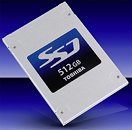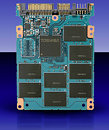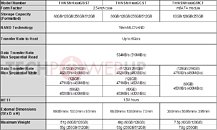- Joined
- Oct 9, 2007
- Messages
- 47,670 (7.43/day)
- Location
- Dublin, Ireland
| System Name | RBMK-1000 |
|---|---|
| Processor | AMD Ryzen 7 5700G |
| Motherboard | Gigabyte B550 AORUS Elite V2 |
| Cooling | DeepCool Gammax L240 V2 |
| Memory | 2x 16GB DDR4-3200 |
| Video Card(s) | Galax RTX 4070 Ti EX |
| Storage | Samsung 990 1TB |
| Display(s) | BenQ 1440p 60 Hz 27-inch |
| Case | Corsair Carbide 100R |
| Audio Device(s) | ASUS SupremeFX S1220A |
| Power Supply | Cooler Master MWE Gold 650W |
| Mouse | ASUS ROG Strix Impact |
| Keyboard | Gamdias Hermes E2 |
| Software | Windows 11 Pro |
Toshiba Electronics Europe (TEE) has announced that solid state drives (SSDs) built on the company's 19nm Multi-Level Cell (MLC) NAND flash technology are now readily available across Europe. Toshiba was the first company to develop 19nm NAND SSDs and the family includes the world's smallest and highest density NAND flash drives.
Toshiba's THNSNH family addresses the storage, performance and power efficiency demands of even the most data-intensive and energy-sensitive systems. The drives are ideal for high-end notebooks, tablets, PCs, all-in-one desktop computers and industrial PCs. Capacities of 512GB1, 256GB, 128GB and 60GB are all now available in 2.5-inch form factors with a choice of 7.0 mm and 9.5 mm profiles. mSATA modules with capacities of 256GB, 128GB and 60GB are also available.


Toshiba's innovation with the THNSNH series includes data protection through use of Quadruple Swing-By Code (QSBC), Toshiba's robust and highly efficient error correction code technology.

View at TechPowerUp Main Site
Toshiba's THNSNH family addresses the storage, performance and power efficiency demands of even the most data-intensive and energy-sensitive systems. The drives are ideal for high-end notebooks, tablets, PCs, all-in-one desktop computers and industrial PCs. Capacities of 512GB1, 256GB, 128GB and 60GB are all now available in 2.5-inch form factors with a choice of 7.0 mm and 9.5 mm profiles. mSATA modules with capacities of 256GB, 128GB and 60GB are also available.


Toshiba's innovation with the THNSNH series includes data protection through use of Quadruple Swing-By Code (QSBC), Toshiba's robust and highly efficient error correction code technology.

View at TechPowerUp Main Site




